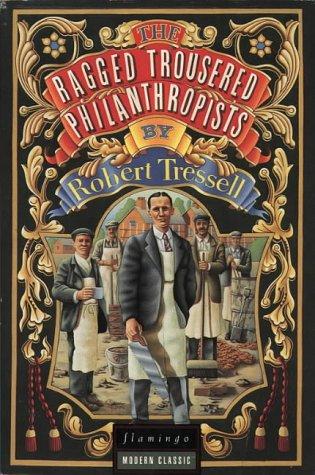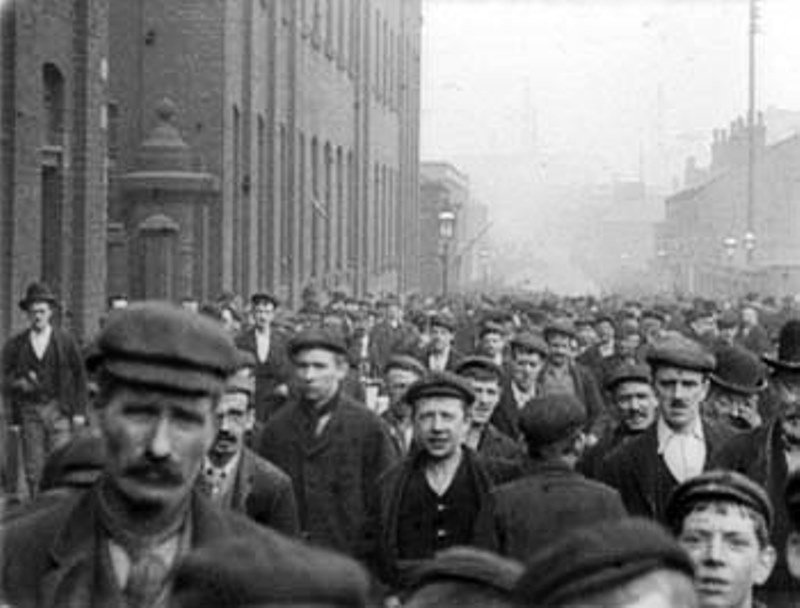 This individual had two patches on the seat of his trousers and the bottoms of the legs of that garment were frayed and ragged. He had been out of work for about six weeks previous to having been taken on by Rushton & Co. During most of that time he and his family had been existing in a condition of semi—starvation on the earnings of his wife as a charwoman and on the scraps of food she brought home from the houses where she worked. But all the same, the question of what is the cause of poverty had no interest for him.
This individual had two patches on the seat of his trousers and the bottoms of the legs of that garment were frayed and ragged. He had been out of work for about six weeks previous to having been taken on by Rushton & Co. During most of that time he and his family had been existing in a condition of semi—starvation on the earnings of his wife as a charwoman and on the scraps of food she brought home from the houses where she worked. But all the same, the question of what is the cause of poverty had no interest for him.
’There are many causes,’ answered Owen, ’but they are all part of and inseparable from the system. In order to do away with poverty we must destroy the causes: to do away with the causes we must destroy the whole system.’
’What are the causes, then?’
’Well, money, for one thing.’
This extraordinary assertion was greeted with a roar of merriment, in the midst of which Philpot was heard to say that to listen to Owen was as good as going to a circus. Money was the cause of poverty!
’I always thought it was the want of it!’ said the man with the patches on the seat of his trousers as he passed out of the door.
’Other things,’ continued Owen, ’are private ownership of land, private ownership of railways, tramways, gasworks, waterworks, private ownership of factories, and the other means of producing the necessaries and comforts of life. Competition in business–’
’But ’ow do you make it out?’ demanded Crass, impatiently.
Owen hesitated. To his mind the thing appeared very clear and simple. The causes of poverty were so glaringly evident that he marvelled that any rational being should fail to perceive them; but at the same time he found it very difficult to define them himself. He could not think of words that would convey his thoughts clearly to these others who seemed so hostile and unwilling to understand, and who appeared to have made up their minds to oppose and reject whatever he said. They did not know what were the causes of poverty and apparently they did not WANT to know.
’Well, I’ll try to show you one of the causes,’ he said nervously at last.
He picked up a piece of charred wood that had fallen from the fire and knelt down and began to draw upon the floor. Most of the others regarded him, with looks in which an indulgent, contemptuous kind of interest mingled with an air of superiority and patronage. There was no doubt, they thought, that Owen was a clever sort of chap: his work proved that: but he was certainly a little bit mad.
By this time Owen had drawn a circle about two feet in diameter. Inside he had drawn two squares, one much larger than the other. These two squares he filled in solid black with the charcoal.
’Wot’s it all about?’ asked Crass with a sneer.
’Why, can’t you see?’ said Philpot with a wink. ’’E’s goin’ to do some conjurin’! In a minit ’e’ll make something pass out o’ one o’ them squares into the other and no one won’t see ’ow it’s done.’
When he had finished drawing, Owen remained for a few minutes awkwardly silent, oppressed by the anticipation of ridicule and a sense of his inability to put his thoughts into plain language. He began to wish that he had not undertaken this task. At last, with an effort, he began to speak in a halting, nervous way:
’This circle–or rather the space inside the circle–is supposed to represent England.’
’Well, I never knowed it was round before,’ jeered Crass. ’I’ve heard as the WORLD is round–’
’I never said it was the shape–I said it was supposed to REPRESENT England.’
’Oh, I see. I thought we’d very soon begin supposin’.’
’The two black squares,’ continued Owen, ’represent the people who live in the country. The small square represents a few thousand people. The large square stands for the remainder–about forty millions–that is, the majority.’
’We ain’t sich bloody fools as to think that the largest number is the minority,’ interrupted Crass.
’The greater number of the people represented by the large black square work for their living: and in return for their labour they receive money: some more, some less than others.’
’You don’t think they’d be sich bloody fools as to work for nothing, do you?’ said Newman.
’I suppose you think they ought all to get the same wages!’ cried Harlow. ’Do you think it’s right that a scavenger should get as much as a painter?’
’I’m not speaking about that at all,’ replied Owen. ’I’m trying to show you what I think is one of the causes of poverty.’
’Shut up, can’t you, Harlow,’ remonstrated Philpot, who began to feel interested. ’We can’t all talk at once.’
’I know we can’t,’ replied Harlow in an aggrieved tone: ’but ’e takes sich a ’ell of a time to say wot ’e’s got to say. Nobody else can’t get a word in edgeways.’
’In order that these people may live,’ continued Owen, pointing to the large black square, ’it is first necessary that they shall have a PLACE to live in–’
’Well! I should never a thought it!’ exclaimed the man on the pail, pretending to be much impressed. The others laughed, and two or three of them went out of the room, contemptuously remarking to each other in an audible undertone as they went:
’Bloody rot!’
’Wonder wot the bloody ’ell ’e thinks ’e is? A sort of schoolmaster?’
Owen’s nervousness increased as he continued:
’Now, they can’t live in the air or in the sea. These people are land animals, therefore they must live on the land.’
’Wot do yer mean by animals?’ demanded Slyme.
’A human bean ain’t a animal!’ said Crass indignantly.
’Yes, we are!’ cried Harlow. ’Go into any chemist’s shop you like and ask the bloke, and ’e’ll tell you–’
’Oh, blow that!’ interrupted Philpot. ’Let’s ’ear wot Owen’s sayin’.’
’They must live on the land: and that’s the beginning of the trouble; because–under the present system–the majority of the people have really no right to be in the country at all! Under the present system the country belongs to a few–those who are here represented by this small black square. If it would pay them to do so, and if they felt so disposed, these few people have a perfect right–under the present system–to order everyone else to clear out!
’But they don’t do that, they allow the majority to remain in the land on one condition–that is, they must pay rent to the few for the privilege of being permitted to live in the land of their birth. The amount of rent demanded by those who own this country is so large that, in order to pay it, the greater number of the majority have often to deprive themselves and their children, not only of the comforts, but even the necessaries of life. In the case of the working classes the rent absorbs at the lowest possible estimate, about one—third of their total earnings, for it must be remembered that the rent is an expense that goes on all the time, whether they are employed or not. If they get into arrears when out of work, they have to pay double when they get employment again.
’The majority work hard and live in poverty in order that the minority may live in luxury without working at all, and as the majority are mostly fools, they not only agree to pass their lives in incessant slavery and want, in order to pay this rent to those who own the country, but they say it is quite right that they should have to do so, and are very grateful to the little minority for allowing them to remain in the country at all.’
Owen paused, and immediately there arose a great clamour from his listeners.
’So it IS right, ain’t it?’ shouted Crass. ’If you ’ad a ’ouse and let it to someone, you’d want your rent, wouldn’t yer?’
’I suppose,’ said Slyme with resentment, for he had some shares in a local building society, ’after a man’s been careful, and scraping and saving and going without things he ought to ’ave ’ad all ’is life, and managed to buy a few ’ouses to support ’im in ’is old age–they ought all to be took away from ’im? Some people,’ he added, ’ain’t got common honesty.’
Nearly everyone had something to say in reprobation of the views suggested by Owen. Harlow, in a brief but powerful speech, bristling with numerous sanguinary references to the bottomless pit, protested against any interference with the sacred rights of property. Easton listened with a puzzled expression, and Philpot’s goggle eyes rolled horribly as he glared silently at the circle and the two squares.
’By far the greatest part of the land,’ said Owen when the row had ceased, ’is held by people who have absolutely no moral right to it. Possession of much of it was obtained by means of murder and theft perpetrated by the ancestors of the present holders. In other cases, when some king or prince wanted to get rid of a mistress of whom he had grown weary, he presented a tract of our country to some ’nobleman’ on condition that he would marry the female. Vast estates were also bestowed upon the remote ancestors of the present holders in return for real or alleged services. Listen to this,’ he continued as he took a small newspaper cutting from his pocket—book.
Crass looked at the piece of paper dolefully. It reminded him of the one he had in his own pocket, which he was beginning to fear that he would not have an opportunity of producing today after all.
’Ballcartridge Rent Dat.
’The hundredth anniversary of the Battle of Ballcartridge occurred yesterday and in accordance with custom the Duke of Ballcartridge handed to the authorities the little flag which he annually presents to the State in virtue of his tenure of the vast tract of this country which was presented to one of his ancestors–the first Duke–in addition to his salary, for his services at the battle of Ballcartridge.
’The flag–which is the only rent the Duke has to pay for the great estate which brings him in several hundreds of thousands of pounds per annum–is a small tricoloured one with a staff surmounted by an eagle.
’The Duke of Blankmind also presents the State with a little coloured silk flag every year in return for being allowed to retain possession of that part of England which was presented–in addition to his salary–to one of His Grace’s very remote ancestors, for his services at the battle of Commissariat–in the Netherlands.
’The Duke of Southward is another instance,’ continued Owen. ’He “owns” miles of the country we speak of as “ours”. Much of his part consists of confiscated monastery lands which were stolen from the owners by King Henry VIII and presented to the ancestors of the present Duke.
’Whether it was right or wrong that these parts of our country should ever have been given to those people–the question whether those ancestor persons were really deserving cases or not–is a thing we need not trouble ourselves about now. But the present holders are certainly not deserving people. They do not even take the trouble to pretend they are. They have done nothing and they do nothing to justify their possession of these “estates” as they call them. And in my opinion no man who is in his right mind can really think it’s just that these people should be allowed to prey upon their fellow men as they are doing now. Or that it is right that their children should be allowed to continue to prey upon our children for ever! The thousands of people on those estates work and live in poverty in order that these three men and their families may enjoy leisure and luxury. Just think of the absurdity of it!’ continued Owen, pointing to the drawings. ’All those people allowing themselves to be overworked and bullied and starved and robbed by this little crowd here!’
Observing signs of a renewal of the storm of protests, Owen hurriedly concluded:
’Whether it’s right or wrong, you can’t deny that the fact that this small minority possesses nearly all the land of the country is one of the principal causes of the poverty of the majority.’
’Well, that seems true enough,’ said Easton, slowly. ’The rent’s the biggest item a workin’ man’s got to pay. When you’re out of work and you can’t afford other things, you goes without ’em, but the rent ’as to be paid whether you’re workin’ or not.’
’Yes, that’s enough,’ said Harlow impatiently; ’but you gets value for yer money: you can’t expect to get a ’ouse for nothing.’
’Suppose we admits as it’s wrong, just for the sake of argyment,’ said Crass in a jeering tone. ’Wot then? Wot about it? ’Ow’s it agoin’ to be altered.’
’Yes!’ cried Harlow triumphantly. ’That’s the bloody question! ’Ow’s it goin’ to be altered? It can’t be done!’
There was a general murmur of satisfaction. Nearly everyone seemed very pleased to think that the existing state of things could not possibly be altered.
’Whether it can be altered or not, whether it’s right or wrong, landlordism is one of the causes of poverty,’ Owen repeated. ’Poverty is not caused by men and women getting married; it’s not caused by machinery; it’s not caused by “over—production”; it’s not caused by drink or laziness; and it’s not caused by “over—population”. It’s caused by Private Monopoly. That is the present system. They have monopolized everything that it is possible to monopolize; they have got the whole earth, the minerals in the earth and the streams that water the earth. The only reason they have not monopolized the daylight and the air is that it is not possible to do it. If it were possible to construct huge gasometers and to draw together and compress within them the whole of the atmosphere, it would have been done long ago, and we should have been compelled to work for them in order to get money to buy air to breathe. And if that seemingly impossible thing were accomplished tomorrow, you would see thousands of people dying for want of air–or of the money to buy it–even as now thousands are dying for want of the other necessities of life. You would see people going about gasping for breath, and telling each other that the likes of them could not expect to have air to breathe unless they had the money to pay for it. Most of you here, for instance, would think and say so. Even as you think at present that it’s right for so few people to own the Earth, the Minerals and the Water, which are all just as necessary as is the air. In exactly the same spirit as you now say: “It’s Their Land,” “It’s Their Water,” “It’s Their Coal,” “It’s Their Iron,” so you would say “It’s Their Air,” “These are their gasometers, and what right have the likes of us to expect them to allow us to breathe for nothing?” And even while he is doing this the air monopolist will be preaching sermons on the Brotherhood of Man; he will be dispensing advice on “Christian Duty” in the Sunday magazines; he will give utterance to numerous more or less moral maxims for the guidance of the young. And meantime, all around, people will be dying for want of some of the air that he will have bottled up in his gasometers. And when you are all dragging out a miserable existence, gasping for breath or dying for want of air, if one of your number suggests smashing a hole in the side of one of the gasometers, you will all fall upon him in the name of law and order, and after doing your best to tear him limb from limb, you’ll drag him, covered with blood, in triumph to the nearest Police Station and deliver him up to “justice” in the hope of being given a few half—pounds of air for your trouble.’
’I suppose you think the landlords ought to let people live in their
’ouses for nothing?’ said Crass, breaking the silence that followed.
’Certainly,’ remarked Harlow, pretending to be suddenly converted to Owen’s views, ’I reckon the landlord ought to pay the rent to the tenant!’
’Of course, Landlordism is not the only cause,’ said Owen, ignoring these remarks. ’The wonderful system fosters a great many others. Employers of labour, for instance, are as great a cause of poverty as landlords are.’
This extraordinary statement was received with astonished silence.







